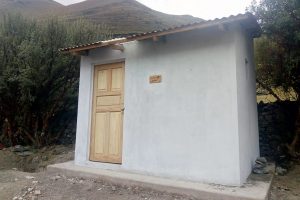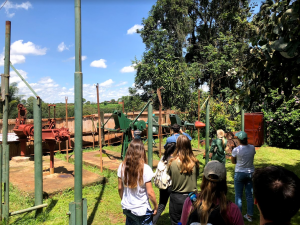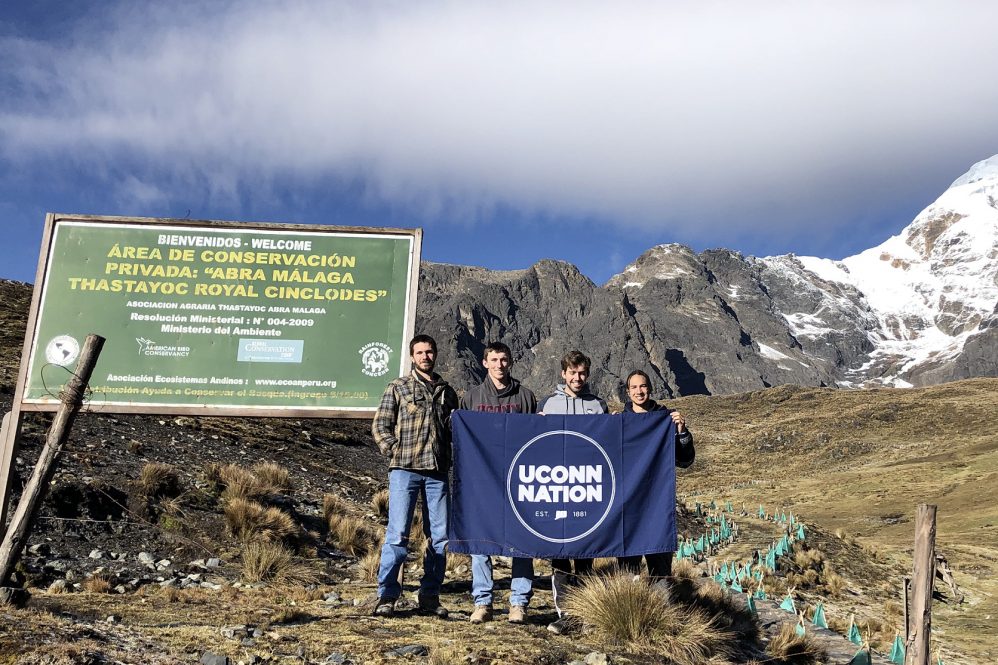In the rocky village of Abra Malága, Peru, about 40 families thrive in the potato-farming community of Thastayoc where residents take care of local routes, enabling traveling and tourism through the steep mountain pass.
But here, only 42% of the inhabitants have access to a latrine, which causes problems of poor sanitation throughout the community. Similarly, 50% of the residents partake in open defecation, which creates a possibility of drinking water contamination.
But, through the efforts of the University of Connecticut’s student chapter of Engineers Without Borders (EWB-UConn), the rural community now has access to a biodigesting-septic latrine and accompanying septic system. And more plans are underway by the club to establish simple sinks and another latrine to further improve sanitation practices and the community’s overall health.
“Engineers play a key role in developing technologies and engineering projects that can make our world more equitable and sustainable, respecting human rights and community values,” says EWB faculty advisor Davis Chacón-Hurtado, assistant research professor in the Department of Civil and Environmental Engineering and Gladstein Family Human Rights Institute. “In EWB-UConn, students have the chance to be part of projects that strive towards achieving those goals, regardless of their engineering specialization.”
On March 24, UConn’s EWB Chapter will host the Engineers Without Borders 2024 Northeast Regional Conference at the Innovation Partnership Building. Participants will attend technical sessions, poster sessions, interactive breakout sessions, professional development and hands-on trainings. The regional meeting, which is expected to bring engineering students working in communities around the world, is being organized by Gabriella Frey ’15 (ENG), who served as a member of UConn’s EWB for four years.

The sanitation mission in Peru is among two projects the 30-member service-oriented club is actively engaged in this year, and will showcase at the conference. Students also are working on creating fresh water supply in Kenya all with the underlying goal of using their engineering skillset to help communities find long term solutions for worldwide problems.
“As a freshman walking through the involvement fair, EWB-UConn was the first club that truly stuck out to me because I’m someone who enjoys helping others in need, but I also want to apply my engineering knowledge and background to a project,” says civil engineering major Ethan Crumrine ’25 (ENG). “I’ve always had an interest in South America as well and EWB proved to be the perfect club to combine volunteering, engineering, and culture. This club has helped me to grow as an engineer and person as I am able to meet a variety of people with different backgrounds, all coming together to work on one project.”
Similarly, computer science major Michael Jankowski ’27 (ENG), joined the Peru project to contribute to community outreach internationally. “Although I have just joined this club recently, I’m excited to grow as an engineering student and be a part of it,” he says.
In Kenya, students are focused on helping a village in the region of Gambela resource enough water to meet the demands needed for both drinking and agriculture. The 20-member team is designing and implementing a water well, solar pump, and irrigation system to aid a population of 2,000 residents who rely on agriculture resources but are suffering from a drought.
“Our project’s ultimate goal is to provide Gambela with a reliable water source to meet all of their needs for growing food and for supporting their livestock,” says electrical engineering major Jack Taylor ’25 (ENG). “Our job is to assess the situation and come up with a way to solve this problem, such as drilling a new well and installing a solar pump that connects to their concrete storage tank.”

This year, the team began Phase 1 of the project by drilling a borehole and gathering information and measurements for an irrigation system. The students work alongside professional engineers and contacts from Global Hope Network International throughout Kenya and Africa.
“In addition to gaining hands-on experience in understanding an engineering problem, discussing project alternatives that consider community inputs, and implementing some projects on the ground, students get the opportunity to develop teamwork, leadership, time management, and communication skills,” Chacón-Hurtado says.
EWB-UConn raises funds for their projects from corporate sponsors, non-profits such as the Rotary Club, campus fundraisers, and the College of Engineering. They advertise the club at social activities and host cultural and professional development events. Club members may sign up for any one of the three projects and can switch if they want a different experience, explains environmental engineering student Rory Cavicke ’24 (ENG), past-president of EWB-UConn. Cavicke joined the club his sophomore year and focused on the Kenya project.
“I wanted to use my engineering skills to help people and gain some meaningful engineering experience before I graduate,” he says. “I have already learned about report writing, communication, and the role of community engagement.”
During the academic year, the students work on designs and plans, and during school breaks, they travel to the site and help implement the plan. The partnerships with the communities last for many years, Cavicke explained. “There are many stages the project must go through before it is completed. We have to do separate trips for the assessment, implementation, and monitoring phases. Since we can only travel during school breaks, the projects take a while to complete, but this process is meant to ensure that the new infrastructure is good quality, and that the community is pleased with it.”
The club members also look outside the field of engineering to help their designated communities. Last spring, members of the Peru program organized a book drive to collect elementary level books in the Spanish language. These books are to be used to improve literacy rates in the village and should also allow easier access to sanitation education that the team also plans to enact on their upcoming trip.
In Kenya, the students taught members of the community how to use third party apps such as Venmo to manage their own money.
“This will help them keep their money safe and become financially modern,” says mechanical engineering major Julia Miller ’27 (ENG), who joined the club to learn more about engineering and communities around the world.
According to EWB president and mechanical engineering major Brian Machado ’25 (ENG), the student chapter is planning two follow-up trips this year; one implementation trip will be to Kenya, and the other will be an assessment trip to Peru during the summer.
The EWB Chapter at UConn existed for several years, but it wasn’t until 2008 when freshman Ethan Butler ’12 (ENG) worked to restructure the group, organized events, and raised more than $70,000 in funds to develop field projects in Nicaragua and Ethopia.
EWB UConn meets at 6:30 p.m. Tuesday in McHugh 110. New members are welcome.



